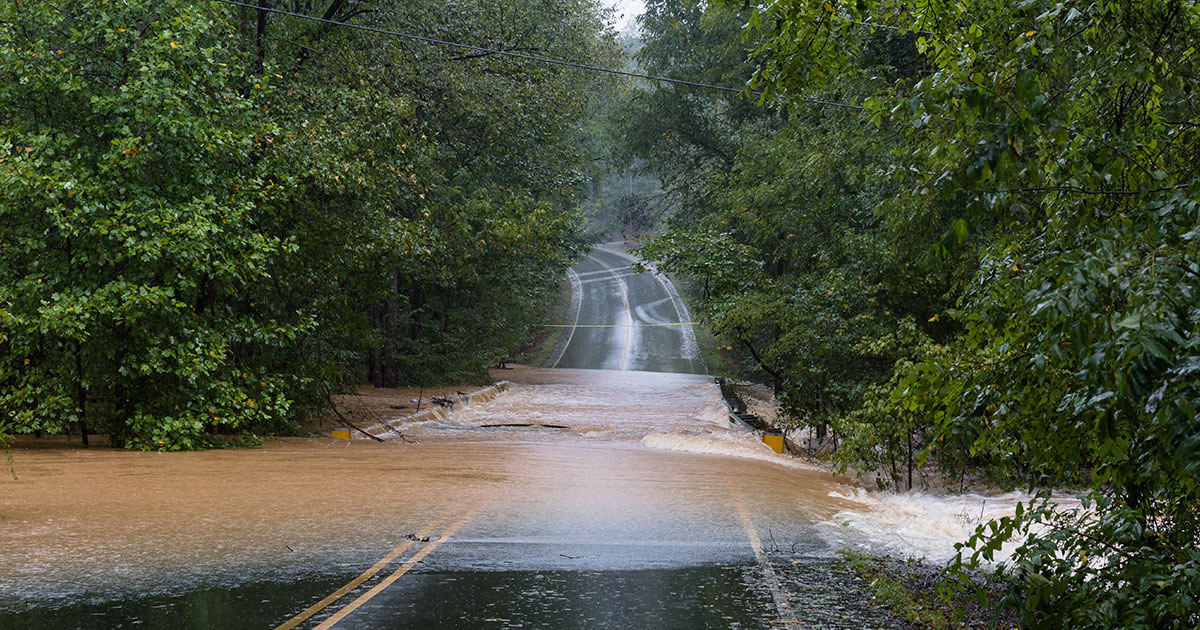
Stormwater and flood management is a field that combines expert knowledge with laws and regulation at multiple levels of government. This resource list includes quick links to helpful resources. Links to the Wisconsin Statutes and Administrative Code are available at the Wisconsin State Legislature’s website, https://docs.legis.wisconsin.gov/. Links to federal statutes are available at https://uscode.house.gov/browse.xhtml. For help finding more information, contact a law librarian.
Stormwater Management
Stormwater, or diffused surface water, is precipitation that runs off the land onto other land parcels, or into waterways. This amorphous water is governed by local, state, and federal law and regulations. The Wisconsin Department of Natural Resources (DNR) regulates the state’s stormwater program.
Relevant statutes and regulations include Wis. Stat. section 66.0821 (sewerage and stormwater systems), Wis. Stat. chapter 281 (water and sewage), and Wis. Admin. Code chapter SPS 382 (which includes stormwater plumbing systems).
Information about DNR permits is at Wis. DNR, Storm Water Runoff Permits, https://dnr.wisconsin.gov/topic/Stormwater (last visited May 16, 2022).
The U.S. Environmental Protection Agency (EPA) also regulates stormwater. For an overview, see U.S. EPA, Stormwater Rules and Notices, www.epa.gov/npdes/stormwater-rules-and-notices (last updated Sept. 16, 2021).
Rainwater-collection guidelines have been put together for Milwaukee residents and property owners. Eric Bunke, Rainwater Collection Guidelines, City of Milwaukee Env’t Collaboration Off. & UWM Sch. of Freshwater Scis. (Aug. 2017), https://city.milwaukee.gov/ImageLibrary/Groups/cityGreenTeam/Stormwater/FINAL_BunkeRWHGuide_designR1_withAcknowledgements_Sept2017.pdf.
Flood Management
Floodplains are areas adjacent to bodies of water that lie beyond the ordinary high-water mark. State and local entities play an important role in flood management through regulation and zoning ordinances, and the Federal Emergency Management Agency (FEMA) is a household name in many areas. FEMA administers the National Flood Insurance Program.
The Wisconsin DNR works with communities to establish floodplain ordinances. Floodplain maps are developed by FEMA in consultation with local governments and the Wisconsin DNR.
An overview is at Wis. DNR, Regulations and Ordinances, https://dnr.wisconsin.gov/topic/FloodPlains/ordinances.html (last visited May 16, 2022).
Relevant state statutes and regulations include Wis. Stat. chapter 30 (navigable waters, harbors, and navigation), chapter 31 (regulation of dams and bridges affecting navigable waters), and chapter 87 (flood control); and Wis. Admin. Code chapter NR 116 (floodplain management program).
Resources on federal law and programs include the following:
Drainage Districts
Some of Wisconsin’s constructed drains are organized as drainage districts, governed by county drainage boards. Drainage districts are regulated by the Wisconsin Department of Agriculture, Trade and Consumer Protection (DATCP). The DNR may approve permits for removal of dams or to engineer a stream.
An overview is at Wis. DATCP, Drainage Districts, https://datcp.wi.gov/Pages/Programs_Services/DrainageDistricts.aspx (last visited May 16, 2022).
Relevant statutes and regulations include Wis. Stat. chapter 88 (drainage of lands) and Wis. Admin. Code chapters ATCP 48 (drainage districts) and NR 345 (dredging in navigable waterways).
State and local entities play an important role in flood management through regulation and zoning ordinances, and the Federal Emergency Management Agency (FEMA) is a household name in many areas.
General Water Law Resources
Many books and articles are available that touch on the topics above. Here are a few, available at the Wisconsin State Law Library or the UW Law School Law Library or with a library card for a Wisconsin public library or using a Wisconsin school barcode or ID. (Apply here for a Wisconsin State Law Library card: https://wilawlibrary.gov/services/librarycard.html (last updated Aug. 18, 2021).)
The American Law Institute’s Restatement of Torts includesdiscussions of water law issues such as surface water use and discharge. This Restatement and others can be accessed online with a Wisconsin State Law Library card.
Available in print and as an eBook from the Wisconsin State Law Library, Waters and Water Rights, by Robert E. Beck, includes analysis of water usage, as well as drainage and flood control.
Paul G. Kent, Wisconsin Water Law in the 21st Century: Understanding Water Rights and Regulations (Madison, Wis.: Lake Mendota Publishing LLC, 2013), summarizes major Wisconsin water law issues, with chapters on diffused surface water, drainage, discharges to surface water, and floodplains.
GreenFILE, https://badgerlink.dpi.wi.gov/resource/greenfile (last visited May 16, 2022), includes scholarly and general-interest articles on a variety of environmental topics. BadgerLink article sources are great places to find articles on the humanities and sciences. Individuals with Wisconsin public library cards can access this database.
Conclusion
These are only some of the resources on stormwater and flood management. To learn more about the science behind stormwater and flood control, visit a library in person or online and ask a librarian for help.
Meet Our Contributors
Where or when do you get your best ideas?
 I’m a big proponent of group brainstorming to tease out questions and solutions. An avid cyclist, I also frequently untangle problems during my morning or evening bike commute. (The smartphone memo system is perfect for this.) However, nothing may ever quite top a moment early in my career when I was having trouble writing a section of code for a web application. That night I dreamed the solution and in the morning, the written code worked perfectly!
I’m a big proponent of group brainstorming to tease out questions and solutions. An avid cyclist, I also frequently untangle problems during my morning or evening bike commute. (The smartphone memo system is perfect for this.) However, nothing may ever quite top a moment early in my career when I was having trouble writing a section of code for a web application. That night I dreamed the solution and in the morning, the written code worked perfectly!
Carol Hassler, Wisconsin State Law Library, Madison
Become a contributor! Are you working on an interesting case? Have a practice tip to share? There are several ways to contribute to Wisconsin Lawyer. To discuss a topic idea, contact Managing Editor Karlé Lester at (800) 444-9404, ext. 6127, or email klester@wisbar.org. Check out our writing and submission guidelines.
» Cite this article: 95 Wis. Law. 43-44 (July/August 2022).
